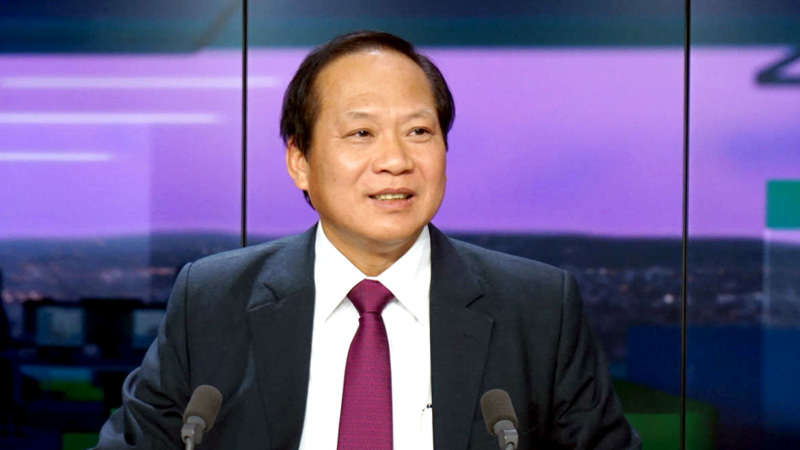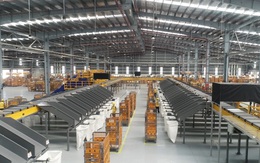First, strengthening the development and training of telecommunication and IT human resources from now to 2020.
Human resources are always a very important factor in promoting the development of science and technology, especially in the field of ICT. To grab the opportunities from the fourth industrial revolution, from now to 2020, the Ministry of Information and Communication (MIC) will gather all resources to support, train and develop the human resources majoring in electronics, telecommunications, IT and information security.
This is a priority task which not only aims to produce more workers in the fields, but also create the workforce with good professional quality, soft skills and fluent foreign language skills so as to be ready for the deeper integration into the global technology market.
In 2017, MIC will work closely with the Ministry of Education and Training (MOET) on the training of human resources in telecommunication and IT which satisfy the market demand and technological development trends in the world, linking the training and scientific research with the operations and the needs of ICT enterprises.

Minister of Information and Communication Truong Minh Tuan
Second, completing the policies and mechanisms to support startups
MIC will join forces with other ministries and branches to complete the legal framework to support startups, especially in the ones in telecommunication and IT. Besides, it will also work on the solutions to support startups through mass media so as to improve enterprises’ images and brands, thus creating favorable conditions for calling and attracting investments from domestic and international institutions.
In order to promote the entrepreneurial spirit within enterprises themselves, instead of general slogans, the ministry will ask enterprises to put forward concrete measures. There will be creative spaces with flexible mechanisms and appropriate investment budgets which allow to apply innovations in practice, develop products & services, and create innovative products, especially the ones with openness for global application.
Third, deploying 4G technology and developing value added services
Vietnam’s large telcos have witnessed big changes in their revenue structure in the last few years. In the past, traditional services such as voice call and SMS made up a large proportion in the total revenue. But nowadays, with the development of 3G and 4G, value added and digital content services account for increasingly high proportion in their revenue.
The deployment of 4G network will lay a high-speed data connection platform, thus facilitating the development of content services. With the increased data access & connection speed, the demand for these services from users will be increasing rapidly, which will allow enterprises to earn more money.
Therefore, in 2017, MIC will supervise and speed up network operators to accelerate the process of building networks to provide 4G services in 2017, ensuring perfect infrastructure conditions for the development of content services on the platform.
In Vietnam, telcos have been interested in the development of content services and the trend of multi-service convergence for a long time. However, I still cannot see their strong determination in deploying these services.
Telcos have great advantages in workforce, apparatus and IT equipment and they have extensive telecommunication networks reaching to every commune and hamlet. However, the provision of content services still does not match with the size of the networks and cannot take full advantage of the available strength.
Content products do not show breakthroughs, while value added services do not show special creativeness and they still cannot satisfy the practical needs in real life.
The convergence of multi-service on one transmission line has been implemented by telcos, but the market still lacks the services specifically designed for rural areas and the majority of households. Internet-based TV services are available, but the service fees are high and therefore, unaffordable to households in many regions.
These are the problems that need to be settled in short term.
In the long run, I hope network operators will accelerate the research and development and master science & technology so as to provide ICT services in packages and ensure the information security not only for government agencies but enterprises as well.
The world is witnessing the strong development of IoT products and services with many apps, such as smarthomes which, based on internet connections, allow to turn on/off household-use appliances from a distance and switch off the appliances after use to save power, or the security system which alerts people when discovering danger.
The smarthomes, plus the smart public services, from the lighting control system the smart traffic control to the smart fire alarm & smoke detection systems all will create a smart city. All of these will need the connection, creative participation and implementation of ICT enterprises, of which telcos will play the key role.
Together with the development of services and in-depth apps to serve people and the social security as I mentioned above, the development and bringing Vietnam’s IT and telecommunication to the world will also be a necessary work.
We need to accelerate the development of creative telecom & IT services with Vietnamese characteristics to meet the trend of the fourth technology revolution, thus laying down a solid platform for Vietnam’s IT and telecom industry to reach out to the world.
Vietnamese enterprises’ operation overseas will not only aim to develop business, but will only serve as the bridge to convey the images of Vietnamese people and Vietnamese culture to the friends in the world in a convincing way.
Fourth, developing e-commerce and improving the effectiveness of state agencies’ operation
In the time to come, MIC will build up the policies to synchronously develop the domestic information technology infrastructure and communication, promote the development of e-government, improve the quality and efficiency of state agencies’ operation.
Right in 2017, MIC with cooperate with relevant ministries and agencies to implement comprehensive solutions to upgrade Vietnam's position in e-government in the United Nations’ ranking.
Besides, the ministry will also apply the measures to accelerate the application of IT in ministries, branches and localities in accordance with the national program on applying IT in state management agencies in 2016-2020 and the Resolution No 36a/NQ-CP dated October 14, 2015 on e-government organization; assess and announce the state agencies’ rankings in IT application and online public service provision.
The ministry will also accelerate the application of IT in the management, exploitation and operation of the economic, social and economic infrastructure systems and the entire economy, with the priority given to the building of national databases, including the database on population, land finance, insurance, business registration, and the database on population to create the foundation for the development of e-government and the application of IT in managing the resources for the country development.
Fifth, heightening the state management efficiency in electronic transactions
With the great development all over the globe, internet has become an indispensable part in the daily life of the majority of people in the world, including Vietnam. Therefore, the use of the services and utilities in electronic transactions to satisfy daily needs has become more necessary than ever. Electronic transactions have become more popular in socio-economic activities. It is estimated that electronic transactions are utilized in over 1,300 fields, including sending emails, e-documents, exchanging e-materials, making e-payment and e-commerce.
However, in Vietnam, the development of different kinds of electronic transactions has been meeting with many difficulties, especially in authentication and security. This is the most important factor which determines the success of electronic transactions in Vietnam.
Being well aware of the need to develop e-government and e-commerce, MIC in 2017 is amending the Decree No 26 which guides the implementation of the Law on Electronic Transactions in terms of digital signature and digital signature authentication so as to create a more favorable framework for the activities.
The ministry with continue joining forces with relevant ministries and branches to take necessary measures to promote the strong deployment of e-authentication services in the society, contributing significantly to improving the IT application capacity and enterprises’ competitiveness.
The development of e-authentication services is believed to be the prerequisite condition and the basis for the deployment of electronic transactions in state management, including e-government and e-customs, or the services for the whole society such as healthcare, training, finance, banking and e-payment.
Sixth, strengthening information security
Information security is always a hot topic which is a concern of MIC because its decisiveness in the sustainable development of the telecommunication & IT sector.
In 2017, MIC will focus on some key tasks which aim to reinforce and strengthen the work of ensuring information security in the time to come. The training to heighten the awareness and skills, the organization of exercises to improve the capability of responding in emergency, the checking of weak points in information systems and the investment in important solutions to prevent cyberattack risks will continue to be implemented.
The lessons on information security from developed countries show that it is not enough to invest in technological solutions, but it is also necessary to invest in human resources by heightening people’s awareness and skills on information security. Only if Vietnam has qualified workforce in information security, will it be able to operate effectively modern technical systems and gradually improve Vietnam’s image in the world’s information security map.


